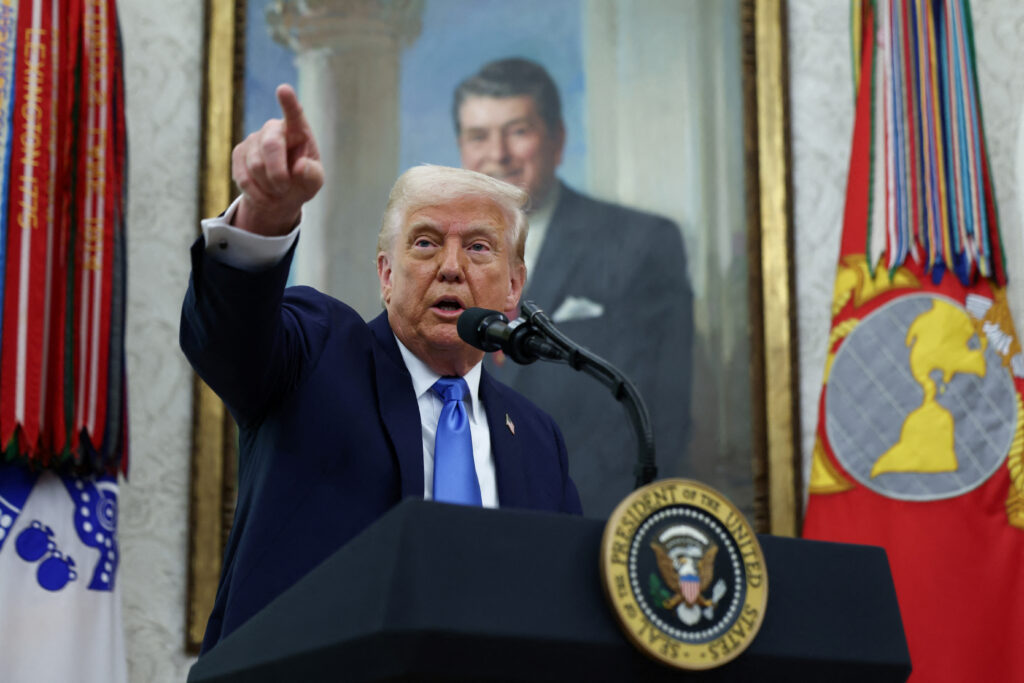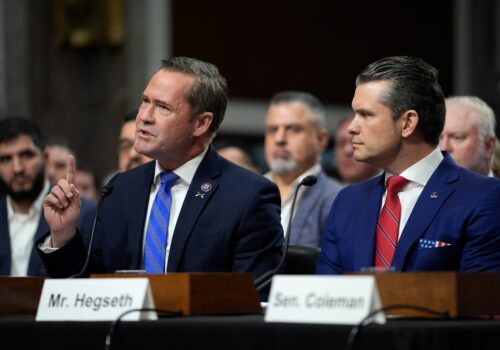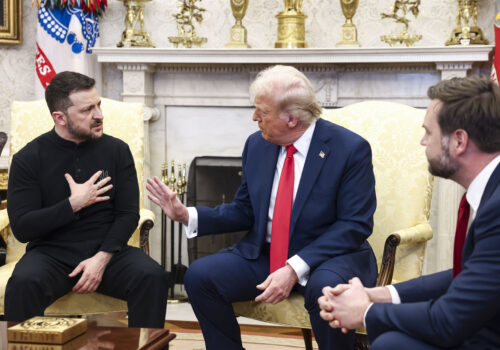It was just another head-spinning, history-bending, vertigo-inducing week in US President Donald Trump’s Washington.
The nonstop use of the word “unprecedented” is justified, but it fails to capture the gravity of what’s happening. As one Trump ally put it to me this past week, the president’s critics have underestimated his determination to deliver on what he has called “a revolution of common sense,” one that will upend everything from transatlantic relations and the future of the Middle East to US foreign assistance and executive authority.
“The genie is out of the bottle,” a senior official from a NATO country told me this past week. He shared that a growing list of European allies are seeking self-sufficiency, concluding that, after eighty years, the era of reliable US security in Europe following World War II is irrevocably over.
I disagreed with the finality of that observation, as NATO remains in place alongside its cornerstone Article 5, obligating all allied nations to come to the assistance of an attacked member. Greater European defense spending, I argued, is one of the more positive outcomes of the Trump administration’s first weeks.
Yet there’s not a conversation I have with European officials these days in which they aren’t asking fundamental questions: Do they now need their own nuclear weapons? Do they need to expand trade relations with China? Can they defend Ukraine from Russia? Can they help allied Denmark keep control of its autonomous territory of Greenland?
“Woke, weak, and freeloading”
One European ambassador, weary from countless meetings over Trump’s tariffs, summed up the thinking of the Trump officials he meets with: “The consensus is that Europe is woke, weak, and freeloading,” he said. “It’s not a minority view.”
Again this past week, US Vice President JD Vance emerged as the Europe-basher-in-chief through an extraordinary Signal chat among top administration officials that inadvertently included Atlantic Editor in Chief Jeffrey Goldberg, who reported out its details.
In the chat, Vance questioned Trump’s willingness to strike Houthi rebels in Yemen who have been disrupting global shipping that passes through the Red Sea. Vance’s reasoning was that this waterway, through which flows more than 10 percent of global trade, serves Europe more than the United States.
“I just hate bailing Europe out again,” he wrote, to which US Defense Secretary Pete Hegseth replied, “I fully share your loathing of European free-loading. It’s PATHETIC.”
You can read more about what the Wall Street Journal called the administration’s accelerating “anti-Europeanism” in the cover story of its latest Weekend Review section, “What Does MAGA Have Against Europe?”
“Europeans,” write authors David Luhnow and Marcus Walker, “even those who thought they were prepared for a second Trump presidency, have been stunned by the speed of events.”
They cite the Trump administration’s European Union–targeted tariffs, embrace of Russia’s misleading talking points on Ukraine, sidelining of Europeans in peace talks about their own continent, and “watered down” security commitments to allies.
By Friday, Vance added a new concern for Europe with his visit to Greenland with his wife, Usha, National Security Advisor Mike Waltz, and Secretary of Energy Chris Wright. He endorsed Trump’s ambition to annex this autonomous territory of the Kingdom of Denmark, without mentioning that it is already part of the traditionally US-led NATO alliance.
Speaking at a US space base above the Arctic Circle, with US military members arrayed behind him, Vance told Greenlanders, “I think that you’d be a lot better coming under the United States’ security umbrella than you have been under Denmark’s security umbrella.”
This was the same US vice president who a few weeks earlier had stunned Europeans at the Munich Security Conference through his de facto endorsement of the far-right Alternative for Germany political party just days ahead of that country’s election, and through his contention that Europe’s “threat from within” from suppressing free speech was larger than the threats from China or Russia.
“No turning back”
Amid all this, you could be forgiven if you missed last Thursday’s statement by Mark Carney, Canada’s new prime minister, that “the United States is no longer a reliable partner,” a situation from which there was “no turning back.” That came a day before Carney’s call with Trump that the Canadian government praised as “constructive.” The two leaders agreed to negotiate a new economic and security relationship after Canada’s April 28 elections.
Then on Friday, the Trump administration finalized the long-signaled dismantling of the United States Agency for International Development, the government’s primary agency for distributing foreign aid, and fired almost all of the employees at the headquarters of the congressionally funded US Institute of Peace.
If you’re a Wall Street investor, however, you paid more attention this past week to falling consumer settlement, rising inflation, and a new set of 25 percent tariffs on vehicles and auto parts. That was prologue to what Trump has referred to as this coming week’s “liberation day,” the culmination of more tariffs making up his “America First Trade Policy” aimed at revitalizing US manufacturing. That’s likely to exacerbate the markets’ dismal March, which is on pace to be the worst month for US stock performance since December 2022.
In a Truth Social post foreshadowing next week’s announcements, Trump wrote, “For DECADES we have been ripped off and abused by every nation in the world, both friend and foe. Now it is finally time for the Gold Ol’ USA to get some of that MONEY, and RESPECT, BACK.”
Meanwhile Ukraine, the country whose stakes in the United States’ policy directions are existential, received a new draft economic agreement this week from the Trump Treasury Department that would give the United States sweeping powers over the country’s critical minerals and other natural resources. The Wall Street Journal has reported that the fifty-five-page draft is much tougher than the version left unsigned after Ukrainian President Volodymyr Zelenskyy’s tumultuous, televised Oval Office meeting on February 28.
A senior Ukrainian official told me that Kyiv has come to terms with Washington’s shift from being its leading ally during the Biden administration—when Ukraine’s primary complaint was about the pace, quantity, and quality of the weapons being provided—to being at best a neutral mediator.
“Every revolution has its own logic”
I asked a Trump ally, someone I’ve known for some time, to help me understand the underlying logic of this flurry of activity and the president’s end game. He reminded me of my time as a Wall Street Journal reporter covering the rise of Solidarity in Poland, the fall of the Berlin Wall, and the collapse of the Soviet Union.
“What you’re witnessing is a revolution,” he said, “and as you know every revolution has its own logic, its own rules, and its own confusion.” A couple of other acquaintances in Trump world agreed with that assessment, though they added that the more transactional and pragmatic Trump isn’t as revolutionary as some others in the administration who are seeking to drive events.
What we’re experiencing is a revolution against a range of perceived adversaries that vary depending on who you talk to in Trump world. There’s “the Deep State,” which is understood as some mixture of the Central Intelligence Agency, the military, and other long-serving government officials. There’s woke ideology in general in the United States, which is seen to have taken root after eight years of President Barack Obama and four years of President Joe Biden. Similarly, but more pointedly, there is the liberal media. These perceived adversaries also overlap with long-standing grievances, such as those regarding regulatory excesses of the administrative state, federal waste and overspending, and trading partners and military allies that seem to take advantage of US largesse.
Perhaps most important, the revolution is about breaking what Trump administration officials believe needs to be fixed, whether it is foreign assistance or international trade, because previous experience has shown that reforms aren’t possible.
One word of warning here: History shows that revolutions rarely achieve all their goals. But they do inevitably leave behind a great deal of change—some of it lasting and some of it less so. In the short term, the revolutionaries are willing to accept a great deal of intended and unintended harm, whether it be to stock-market values or to federal workers’ livelihoods.
For a deeper understanding of the revolution, a Trump administration official referred me to a new book by Heritage Foundation President Kevin Roberts, with a forward by Vance, called Dawn’s Early Light: Taking Back Washington to Save America. (The more inflammatory original title spoke of “Burning Down Washington to Save America” and included a burning match on its cover.)
The promotional language on the publisher’s website says that Roberts is outlining a peaceful “Second American Revolution” for voters looking to shift power back into the hands of the people. “A corrupt and incompetent elite has uprooted our way of life and is brainwashing the next generation. Many so-called conservatives are as culpable as their progressive counterparts . . . Global elites — your time is up.”
“A grand celebration”
How this Trump “revolution” unfolds, if that’s what it is, will depend on many factors, including how the US economy fares, how US voters respond through the 2026 midterm elections, and how US courts and Congress respond to presidential decisions and executive orders that are contested as constitutional overreach.
One Trump administration official urges me to pay particular attention to next year’s 250th anniversary of the signing of the Declaration of Independence, for which ambitious plans are already coming together that will make the tall ships of the two hundredth anniversary pale in comparison. There’s already an executive order about that, calling for “a grand celebration worthy of the occasion.”
Trump has never been understated about his intentions.
Just three days after his inauguration, Trump announced before the bastion of global elites, the World Economic Forum in Davos, the beginning of “a Golden Age of America.” Said Trump, “What the world has witnessed in the past seventy-two hours is nothing less than a revolution of common sense. Our country will soon be stronger, wealthier, and more united than ever before, and the entire planet will be more peaceful and prosperous as a result of this incredible momentum, and what we’re doing and going to do.”
History, however, won’t judge him on that audacious rhetoric but rather on his results. What’s at stake is whether his unfolding revolution leaves the United States, its allies, and the world in a better place than he found it. That’s a scorecard of generational consequence.
Frederick Kempe is president and chief executive officer of the Atlantic Council. You can follow him on X: @FredKempe.
This edition is part of Frederick Kempe’s Inflection Points newsletter, a column of dispatches from a world in transition. To receive this newsletter throughout the week, sign up here.
Further reading
Thu, Mar 27, 2025
Our experts separate Signal from noise in the Trump team’s messages about bombing the Houthis
New Atlanticist By
The still-unfolding revelations offer perhaps the clearest picture yet of how top officials in the Trump administration are thinking about US foreign policy.
Wed, Mar 26, 2025
There’s a right way to lift sanctions on Russia. Follow these Dos and Don’ts.
New Atlanticist By Daniel Fried, Kimberly Donovan
A former US diplomat and a former US Treasury official offer eleven guiding principles for moving forward in negotiations on sanctions relief with Russia.
Sun, Mar 2, 2025
Zelenskyy and Europe confront the first contours of the Trump World Order
Inflection Points By Frederick Kempe
The Ukrainian president’s tempestuous recent meeting at the White House was a window into a larger transformation of global order by the US president.
Image: US President Donald Trump speaks during a swearing-in ceremony for Alina Habba as interim U.S. Attorney for the District of New Jersey, in the Oval Office at the White House in Washington, D.C., U.S., March 28, 2025. REUTERS/Evelyn Hockstein



